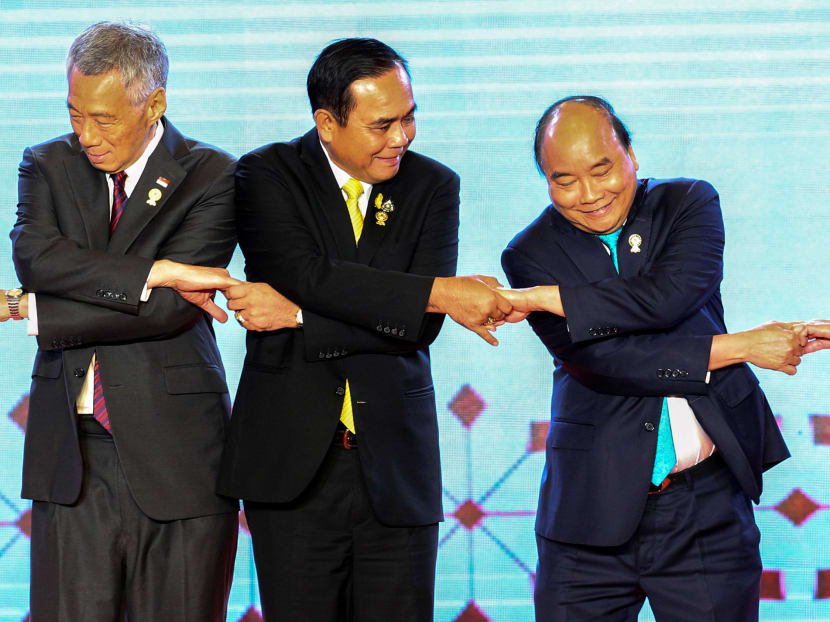Amid US-China tensions, Asean must find common ground to speak with one voice: PM Lee
BANGKOK — The Association of Southeast Asian Nations (Asean) can stand together and “speak with one voice” in the face of United States-China tensions, but they must first find common ground in spite of strategic differences, said Prime Minister Lee Hsien Loong.

(From left) Singapore's Prime Minister Lee Hsien Loong, Thai Prime Minister Prayuth Chan-ocha and Vietnam's Prime Minister Nguyen Xuan Phuc shake hands on stage during the opening ceremony of the 34th Asean Summit at the Athenee Hotel in Bangkok, Thailand, June 23, 2019.
BANGKOK — The Association of Southeast Asian Nations (Asean) can stand together and “speak with one voice” in the face of United States-China tensions, but they must first find common ground in spite of strategic differences, said Prime Minister Lee Hsien Loong.
“As smaller countries, we are not able to control what the big powers do,” Mr Lee said on Sunday (June 23) during a retreat at the 34th Asean Summit in Bangkok.
“But Asean can stand together and speak with one voice, so as to advance our collective interests, whether in trade, security or technology.”
Still Mr Lee said it was “not easy” as Asean comprises 10 different countries with “strategic forces that pull us in different directions”. “But we must find common ground where our interests align, and speak as one,” he added.
Mr Lee’s speech comes as the US and China are embroiled in disputes across areas like trade, maritime security and technology, plunging the global climate into uncertainty.
He said he hopes the two superpowers will work out their frictions peacefully, noting that many Asean nations are friends with the US and have China as their largest trading partner.
“Therefore we all want to preserve a stable external environment and maintain the open and rules-based system which has underpinned the region’s stability and development,” he added.
MARITIME SECURITY
Mr Lee said he was pleased that Asean has made progress in discussions on the Code of Conduct (COC) in the disputed South China Sea, with a first draft ready for reading likely by the end of this year.
Chinese Premier Li Keqiang said in November that he hopes COC consultations would be completed in three years.
While Mr Lee said it’s good that the first reading will be completed soon, he acknowledged that “fundamental and complex issues remain to be discussed”.
“We welcome the aspiration to conclude the COC in three years, and we should exert ourselves to make progress actively, but it is also most important to get the outcomes right,” he said, noting that it was important for the COC to be settled in accordance with international law, including the 1982 UN Convention on the Law of the Sea.
“I am confident that we can achieve progress if we apply our minds, understand each other’s points of view and approach the issue constructively.”
TRADE
On the economic front, Mr Lee noted that Asean has made “substantial progress” in eliminating tariffs, liberalising investments, streamlining regulations and promoting connectivity.
“We should continue to strive for regional trade arrangements, so as to incrementally build support for lower trade barriers and higher standards,” he said.
To this end, Mr Lee urged members to make a “renewed push” for the conclusion of the Regional Comprehensive Economic Partnership (RCEP), slated for completion this year.
When inked, the pact — involving Asean, China, Japan, South Korea, India, Australia and New Zealand — will form the world’s largest trading bloc, making up a third of the global gross domestic product.
In a Facebook post on Saturday following an RCEP meeting at the summit, Trade and Industry Minister Chan Chun Sing said an “expeditious conclusion” of the trade pact will send a strong message of Asean’s commitment to uphold the global trading system.
“The RCEP can make a big difference because it brings together all the key countries on the western side of the Pacific, including Northeast Asia and India, Australia and New Zealand,” Mr Lee said.
He added that Asean should look for “new and non-traditional” opportunities for economic cooperation, like the Asean Agreement on E-Commerce and Asean Smart Cities Network.
These initiatives enable businesses and consumers to easily access and move data across borders, and deepen Asean’s integration and proposition as a single digital market, he said.
“Together these efforts will help us remain competitive, create new jobs and cushion the impact of external shocks,” he added.
“REMAIN UNITED”
Mr Lee said Asean has contributed a lot to its members’ well-being and the region’s security.
“With the uncertainty in the global environment, it is imperative that we remain united as one Asean,” he added.
“I hope that our members continue to have the wisdom and courage to cooperate, opt for openness and engagement, and thus preserve and expand the progress which we have made together.” CNA
For more news like this, visit cna.asia.









